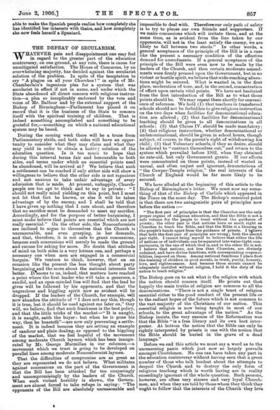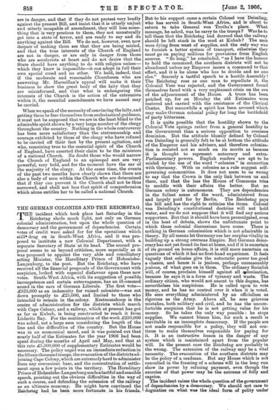THE DEFEAT OF SECULARISM.
NIVHATEVER pain and disappointment one may feel in regard to the greater part of the education controversy, on one ground, at any rate, there is cause for unmitigated satisfaction. The House of Commons, by an overwhelming majority, has decided against the secularist solution of the problem. In spite of the temptation to cry " A plague on all your Churches ! " in spite of Mr. Chamberlain's ingenious plea for a system that was secularist in effect if not in name, and under which the State abandoned all direct concern with religious instruc- tion—a plea so inexplicably endorsed by the vote and voice of Mr. Balfour and by the external support of the Bishop of Birmingham—Parliament has placed it on record that it is the business of the State to concern itself with the spiritual training of children. That is indeed. something accomplished and something to be grateful for,—something on which a national educational system may be based.
During the coming week there will be a truce from Parliamentary strife, and both sides will have an oppor- tunity to consider what they may claim and what they may yield in order to obtain a lastin-; solution of the education question. Is it too much to hope that during this interval terms fair and honourable to both sides, and terms under which no essential points need. be abandoned, will be arrived at ? We believe that such a settlement can be reached if only either side will show a willingness to believe that the other side is not rapacious and not anxious to take unfair advantage of every admission that is made. At present, unhappily, Church- people are too apt to think and to say in private : " I should not really mind yielding on this point, but I must not let that fact be known, or else it will be taken advantage of by the enemy, and I shall be told that I have given up nothing that I care about, and therefore that no sacrifice must be demanded to meet my sacrifice. Accordingly, and for the purpose of better bargaining, I must make believe that points are essential which are not really essential." On the other side, the Nonconformists are inclined to argue to themselves that the Church is unreasonable, and even grasping, in her demands, and that, therefore, - it is not safe to grant concessions, because such concessions will merely be made the ground and excuse for asking for more. No doubt that attitude of mind on both sides is a very htIman one, and perhaps a necessary one when men are engaged. in a commercial bargain. We venture to think, however, that on an occasion like the present the less thought about party bargaining.and the more about the national interests the better. It seemsto us, indeed, that matters have reached a point where the first leader who will take a generous, a candid, and an open-minded line will find that the lead lie gives will be followed. by his opponents, and that the ungracious and higgling spirit now so evident will be dropped. If the leaders of the Church, for example, will now abandon the attitude of " I dare not say this, though it is true, lest it should be used against me later on," they will, we believe, find that such frankness is the best policy, and that the little tricks of the market —" It is naught, it is naught, saith the buyer : but when he is gone his way, then he boasteth"—are now only preventing a settle- ment. It is indeed because they are setting an example of candour and plain dealing, as opposed to the higgling of the market, that we feel hopeful of the movement among moderate Church laymen which has been inaugu- rated by Mr. George Macmillan in our columns,—a movement which we trust is going to be developed on parallel lines among moderate Nonconformist laymen. That the difficulties of compromise are as great as they are represented we do not believe. What militates against concessions on the part of the Government is that the Bill has been attacked far too unsparingly and uncompromisingly by the leaders of the Church. When such violent hostility is shown, the Govern- ment are almost formd to take refuge in saying: " The opponents of the Bill are absolutely unreasonable and impossible to deal with. Therefore our only path of safety is to try to please our own friends and supporters. If we make concessions which will irritate them, and at the same time, as is evident from the line taken by our opponents, will not in the least satisfy the enemy, we are likely to fall between two stools." In other words, a general acceptance of the principle of the Bill is in a case like the present a necessary condition of the effective demand for amendments. If a general acceptance of the principle of the Bill were even now to be made by the leaders of the Church, and then certain moderate amend- ments were firmly pressed upon the Government, but in no violent or hostile spirit, we believe thatwide-reaching altera- tions might be secured. What is wanted is, in the first place, moderation of tone, and, in the second, concentration of effort upon certain vital points. We have not hesitated from the first introduction of the Bill as to what those points should be. We may repeat them shortly for conveni- ence of reference. We hold (1) that teachers in transferred schools should not be forbidden to give religious instruction on the two days when facilities for denominational educa- tion are allowed ; (2) that facilities for denominational teaching should be given to all denominations in all schools ; (3) that Clause IV. should be made mandatory; (4) that religious instruction, whether denominational or undenominational, should be given in school hours, though subject, of course, to the parent's right of withdrawing his child ; (5) that Voluntary schools, if they so desire, should be allowed to "contract themselves out," and return to the system which prevailed before 1902, when they obtained no rate-aid, but only Government grants. If our efforts were concentrated on these points, instead of wasted in unreal, and often unjust and ignorant, denunciations of " the Cowper-Temple religion," the real interests of the Church of England would be far more likely to be secured.
We have alluded at the beginning of this article to the Bishop of Birmingham's letter. We must now say some- thing of that of the Bishop of Carlisle which appeared in the Times on the same day. The Bishop's essential point is that there are two antagonistic pairs of principles now before the nation :- "The first pair of principles is that the Churches are the only proper organs of religious education, and that the Bible is not a safe volume for the people to trust without the guidance of priests ; the other pair is that nations have as much right as Churches to teach the Bible, and that the Bible is a, blessing in the people's hands apart from the guidance of priests. I believe that both the first pair of principles are wrong; both the second pair right. I cannot bring myself to believe that either the life of nations or of individuals can 134 separated into water-tight com- partments, in the one of which God is, and in the other He is not. I believe that nations, not less than Churches, are divinely ordained, and have divine functions, with corresponding responsi- bilities, imposed on them. Among national functions I place first the training of children in good morals, in truth, purity, honesty, love, and righteousness. And because these morals cannot be adequately instilled without religion, I hold it the duty of the nation to teach religion."
The Bishop goes on to ask what is the religion with which the nation should concern itself. He points out that happily the main truths of religion are common to all the denominations. " There is not a single tenet of religion essential either to the good conduct of the present life or to the radiant hopes of the future which is not common to the vast majority of the Christians of our nation. This essential religion is now being taught in most of our schools, to the great advantage of the nation." As the Bishop insists, the very essence of the Reformation was that the Bible " is a free library and its own best inter- preter. At bottom the notion that the Bible can only be rightly interpreted. by priests is one with the notion that the Bible should. be buried in the grave of a dead language."
Before we end this article we must say a word as to the unreasoning panic which just now so largely prevaile amongst Churchmen. No one can have taken any part in the education controversy without having seen that a great number of those who talk loudest about the attempts to despoil the Church and to destroy the only form of religious teaching which is worth having are in reality exceedingly ignorant of the whole question. Such persons, however, are often very sincere and very loyal Church- men, and when they are told. by those whom they think they ought to follow that the interests of the Church they love are in danger, and that if they do not protest very loudly against the present Bill, and insist that it is utterly unjust and utterly incapable of amendment, they will lose some- thing that is very precious to them, they not unnaturally get into a state of terror, and are ready to say and do anything against the Bill. We do not, however, even now despair of making them see that they are being misled, and that the true interests of the Church of England are not in danger, or are only in danger from those who are secularists at heart and do not desire that the State should have anything to do with religion unless— which they know is impossible—it can adopt in full their own special creed and no other. We hold, indeed, that if the moderate and reasonable Churchmen who are answering Mr. Macmillan's appeal will make it their business to show the great body of the laity that they are misinformed, and that what is endangering the interests of the Church is the action of the extremists within it, the essential amendments we have named may be carried.
When we speak of the necessity of convincing the laity, and getting them to free themselves from ecclesiastical guidance, it must not be supposed that we are in the least blind to the admirable spirit shown by a very large number of the clergy throughout the country. Nothing in the whole controversy has been more satisfactory than the statesmanship and courage exhibited by those of the clergy who have refused to be carried off their feet by the present agitation, and who, remaining true to the essential spirit of the Church of England, have asserted their claim to be the ministers of a national Church. No doubt those who would narrow the Church of England to an episcopal sect are very powerful, very bold, and for the moment have the ear of the majority of the clergy. At the same time, the events of the past two months have clearly shown that there are also a body of men within the Church who are determined that if they can prevent it the Church shall not be thus narrowed, and shall not lose that spirit of comprehension which alone entitles her to be called a national Church.







































 Previous page
Previous page